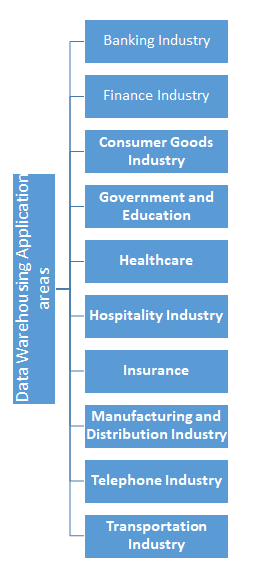
Introduction to Career in Data Warehousing
With the tremendous data growth in the past years, there is a need to organize this data to extract valuable information, which calls for data warehousing. There are a lot of opportunities in the market to build a Career in Data Warehousing, as most companies nowadays deal with data.
Data warehousing consists of the following:
- Data cleaning
- Data integration
- Data consolidations
Data warehousing is like creating a warehouse of data from different sources that may be structured or unstructured, generally from ad-hoc requests, which help in decision-making and also helps in deriving analytical insights.
Education Required to Build a Career in Data Warehousing
- To build a career in data warehousing, a data warehouse engineer should have a bachelor’s degree in Computer science, information technology, data science/statistics, or any other related field. Prior working experience equivalent to the same is also acceptable.
- To build a career in data warehousing, a data warehouse engineer should have at least two years of experience in SQL server coding and SQL server administrationTheyhe should also have good knowledge of server integration and an understanding of ETL tools.
- To build a career in data warehousing, a data warehouse engineer should also understand dimensional modeling and other data warehousing techniques. Good knowledge of setting up cross-functional and relational databases. The candidate should know ETL, Tableau, or any other analytics platform (SpagoBI).
- To build a career in data warehousing, a data warehouse engineer must possess excellent skills in using Ms. Word, PowerPoint, Ms. Excel, MS Project, MS Visio, and MS Team Foundation Server, which will help them to create good data designs and also help in creating good documents and reporting process across various business modules.
- To build a career in data warehousing, a data warehouse engineer should be able to diagnose complex data warehouse processes, business logic failures, and data flow issues. For this, they should be proficient in analyzing and debugging SQL queries. They should also be proficient in scripting languages like Python, C sharp, Perl, R, etc.
- To build a career in data warehousing, a data warehouse engineer must have good interpersonal skills, be open-minded, and welcome any changes; they should be self-motivated, proactive, and go beyond the call of duty.
- To build a career in data warehousing, a data warehouse engineer should have excellent people skills and should be able to make substantial, meaningful, and last relationships with others in the company. They should be approachable so that .he/she can give insights to the collaborating personnel or the senior management.
Career Path
There are generally two kinds of databases: an OLAP (Online Analytical Processing) Database and a traditional relational database design known as OLTP (Online Analytical Transaction Processing).
Data warehousing comes under the data engineering-oriented path. Below is a brief set of courses that help one build a successful career in data warehousing and become a data warehouse specialist.
For beginners, one must be well acquainted with the terminologies of the data warehousing world, and one can go through the below link, which gives a summary of the terminologies used in the real world.
http://www.sqlbootcamp.com/how-to-become-a-data-warehouse-architect/
The go-to path to becoming a data warehouse engineer is taking a computer course at a university specializing in database management and administration. The candidate should be good with computers and efficiently handle humongous data sets.
Nowadays, one can take multiple training programs and part-time courses to become a data warehouse engineer. These are generally for working professionals searching for a switch (change of job/career path). Candidates like this should be open to learning new technologies as these keep on a chance occasionally.
Some of the top schools in data warehousing/database administration are as follows:
- Chicago, Illinois, DePaul University’s College of Computing and Digital Media
- John’s University in Queens, New York
- Pace University in New York, New York
- Arkansas State University in Jonesborough, Arkansas
Application Areas of Data Warehousing
Wherever data is used in an industry/company, it calls for Industry data warehousing, and a few of the application areas of data warehousing are as follows:
Let’s look at a few of them:
- In the banking industry, data warehousing is used in risk management, analyzing consumer data, market trends, and, importantly, in decision-making ( particularly in loan departments).
- In the finance industry, data warehousing is used to analyze customer expense patterns, thereby maximizing clients’ profit.
- In the healthcare industry, data warehousing is used to segregate patients’ data so that it can be given to insurance companies when asked for. It also helps to keep track of employee records and financial transactions safely.
- In the insurance industry, data warehousing is used to analyze data patterns and customer trends to prepare tailor-made policies for customers (custom-made policies for each customer).
- The services sector uses data warehousing to maintain customer profiling, resource management, revenue patterns, and financial records.
- The transportation industry uses data warehousing for storing and maintaining crew data on board and storing financial records for pricing strategies. This also stores customer data to allow campaigners to experiment with their market strategy with many customers.
Salary (US Data and Not India-Specific Figures)
Depending on the educational qualification and experience, the below table shows the salary that a data warehouse engineer will get.
| Education | Experience | Salary in USD |
| Associate’s Degree | <1 | $148,511-$157,815 |
| Associate’s Degree | 3-4 | $149,200-$158,332 |
| Associate’s Degree | 5-6 | $150,062-$158,849 |
| Associate’s Degree | 7-9 | $151,440-$159,883 |
| Bachelor’s Degree | <1 | $150,062-$158,849 |
| Bachelor’s Degree | 3-4 | $150,751-$159,366 |
| Bachelor’s Degree | 5-6 | $151,440-$159,883 |
| Bachelor’s Degree | 7-9 | $152,819-$160,745 |
| Master’s Degree or MBA | <1 | $151,440-$159,883 |
| Master’s Degree or MBA | 3-4 | $152,129-$160,228 |
| Master’s Degree or MBA | 5-6 | $152,819-$160,745 |
| Master’s Degree or MBA | 7-9 | $154,025-$161,778 |
| JD,MD,PhD or Equivalent | <1 | $152,819-$160,745 |
| JD,MD,PhD or Equivalent | 3-4 | $153,336-$161,261 |
| JD,MD,PhD or Equivalent | 5-6 | $154,025-$161,778 |
| JD,MD,PhD or Equivalent | 7-9 | $155,231-$162,640 |
Conclusion or Career Outlook
What makes data warehousing a field to look after is that in the past, only big companies used to use data for predicting the company’s growth, but with the advancements in the field of computing (like AWS, Hadoop, etc.), even smaller emerging companies can leverage this practice. Hence, the need for data warehouse engineer demand grew exponentially. Nowadays, without proper analysis, a company is lost in the market, and if an analysis is the heart of the company, data is the blood.
Recommended Articles
This has been a guide to Career in Data Warehousing. Here we have discussed the introduction, education skills required, application area, salary, and career outlook. You may also look at the following article to learn more –

